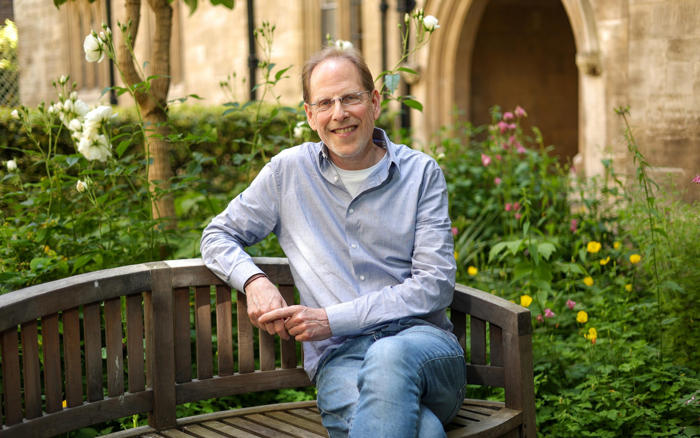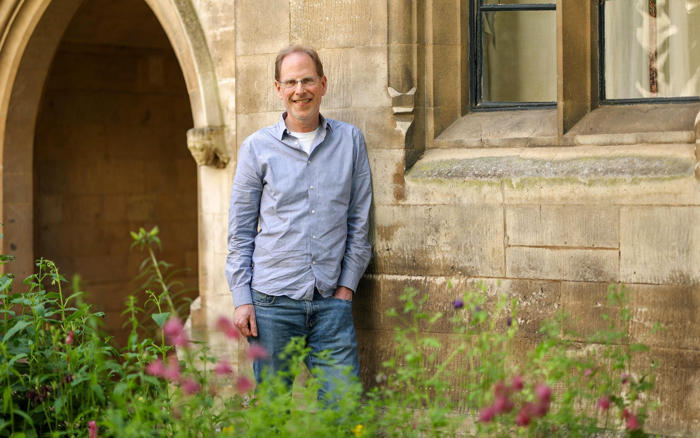Simon Baron-Cohen: ‘The treatment of autistic people is a scandal on the scale of infected blood’

Simon Baron-Cohen, who first became involved with autism research in the summer of 1981, says teachers need to be 'compassionate' when dealing with pupils who are autistic - John Lawrence
The findings of the infected blood inquiry highlighted the appalling human cost of the scandal, after those in authority – doctors, ministers, and officials – chose for four decades to ignore expert warnings that lives were being lost needlessly. And four decades, points out Sir Simon Baron-Cohen, is roughly the same length of time that he – as one of the world’s leading researchers into autism – has been lobbying successive UK governments to address the “alarming” rate of suicide among autistic people, seven times higher than among non-autistic people.
Yet, despite his efforts, it was only last year that autism was finally named as a high-risk factor in the UK’s official Suicide Prevention Strategy. “The comparison with the infected blood inquiry is interesting,” says the 65-year-old director of Cambridge University’s Autism Research Centre, knighted in 2021 for services to autistic people. “We have known for a long time about the mental health crisis in the autism community; 70 to 80 per cent of autistic people have depression or anxiety. And suicide rates are not going down.”
Because of official inaction? “People are dying by suicide. Those who are not dying are living very unhappy lives. And it doesn’t need to be that way.”
We are meeting in his very tidy rooms at the top of a steep staircase in Trinity College, one of Cambridge’s grandest. His rooms give little away, though a copy of Men, Anna Ford’s popular and provocative 1985 feminist survey in which her male subjects revealed how easy they found it to lie and cheat, stands out among rows of academic publications, and hints that Baron-Cohen does not inhabit an ivory tower.
In his public life, he is familiar with the corridors of power and so, in our conversation, he picks his words with care to avoid being labelled a firebrand. Shouting from the rooftops and decrying those in power is not his way.
He is someone who guards his privacy. The questions that inevitably come because he shares an unusual surname with his cousin Sacha, the actor and controversial creator of Ali G and Borat, contribute to that. The two are, he says, “very close”. The full stop after these words is almost audible.
Likewise, press interviews are rare. This one has taken a year to organise but, like many people who make it almost impossible to reach them, in person he is far from daunting. Quietly spoken with a slightly nervous, toothy smile, his default is reasonableness personified in his blue cotton open-necked shirt and drain-pipe jeans.
It makes the moments all the more powerful when, his moderate tone never wavering, he allows himself to land a punch. Such as when he is describing how, in 2014, his Autism Research Centre published a study showing that two-thirds of autistic adults had felt suicidal, and one third had planned or attempted suicide.
All the relevant ministers and mandarins were given a copy, some no doubt by hand. “It took 10 years for that research to be acted upon [by including autism in the Suicide Prevention Strategy]. And in that time a lot of people have died.”
He cannot give an exact figure because the Government still does not publish the number of deaths by suicide each year of autistic people. At the beginning of last month, to coincide with the high-profile inquest into the suicide of 16-year-old Caitlyn Scott-Lee at Wycombe Abbey School in Buckinghamshire, Baron-Cohen was one of the signatories to an open letter to the Government demanding it changes this policy.
Co-signatories included Chris Packham and Jools Holland, both ambassadors of ACE (the Autism Centre of Excellence), the campaigning organisation that Baron-Cohen founded in 2017 after giving a speech to the United Nations on the denial of human rights to autistic people. “We need to know why autistic people are falling through the gaps. What could have been done to save those lives? We need proper scrutiny.”
Sitting tall and upright in his chair opposite me, he is still mulling over the parallels with the inquiry into the infected blood scandal. “Having a whole review like that,” he muses, “will be too late to help those fatalities, but it may be what autism needs, a really thorough review of the neglect. We are neglecting autistic people.”
Negligence is a serious charge when there are 1.2 million autistic people in the UK, or 2 per cent of the population. “As an example, some years ago I created an autism clinic in Cambridgeshire and Peterborough as part of my work here.
“It was initially funded by a charity because the NHS would not fund it. Then the Autism Act came in in 2010 and required NHS trusts to have an ‘autism pathway’, so the NHS took it over. But here we are 14 years later, rates of autism have gone up substantially, and yet they still only have two full-time clinicians.”
How does such negligence make him feel? He pauses to consider before replying. “It is frustrating, it is heartbreaking, it is preventable. We want autistic people to be living fulfilling lives, having good opportunities for education and fair employment. But employment rates among autistic people are appallingly low, only 15 per cent. To me, these are signs that society is not working for autistic people.”
There is quite a range between frustrating and heartbreaking. “Frustrating means you hope things would go quicker. In my case it doesn’t mean I am giving up.”
Simon Baron-Cohen first became involved with autism research in the summer of 1981. He had just graduated in human sciences from New College, Oxford. “I got a job as a teacher in a very small unit for autistic kids. I heard about it by chance but something sparked my curiosity.”
He grew up in a Jewish family in Golders Green, north-west London, as one of five children. His father, Vivian, had been a teacher but then opened a chain of menswear shops, including the eclectic Baron of Piccadilly next to London’s Savile Row.
His sister Suzie, two years younger than him, was born with Sturge Weber’s Syndrome, a rare neurological disorder. “The impact on her was physical, she was in a wheelchair, and she had learning difficulties. She had almost no language, epilepsy and needed 24-hour care. Institutional care was what was recommended.”
That is what was agreed for his sister, though later in life he moved her to supported housing near his home before her death at 54 in 2014. In his eulogy, he said that his family’s life had been “richer for having shared the journey with her”. And he has subsequently linked growing up with his sister to his interest in people “who think or develop differently”.
There was, he recalls of his childhood, “a lot of stigma attached” to disability. And when, post-university, he started as a teacher at the Family Tree school in Barnet, then one of the few specialist autism schools in the country, there was a lot of stigma around autism.
“We were right on the cusp of old theories, attributing autism to the family and particularly the mother. [It was said] that these were children who weren’t developing social relationships perhaps because they hadn’t had the primary social relationship with the mother.”

Simon Baron-Cohen, pictured at Cambridge University, says autistic people are 'generally not enjoying school' and has repeatedly called for government intervention - John Lawrence
At the Family Tree, a new approach was being tried out, with just six children being taught by six teachers. “There were cameras on every wall to tape the interactions so we could review them at the end of the day to see what worked and what didn’t. There wasn’t a framework for how to teach these kids and how to connect with them.”
The experience hardened his resolve to research autism “for as long as I remained interested and here I am 40 years later”. His post-graduate qualifications in psychology were done at University College London, and then the Institute of Psychiatry. In 1994, he came to Cambridge and has stayed ever since.
By the time of his arrival, he and his lawyer wife Bridget Lindley already had two children, Sam and Kate. Robin arrived soon afterwards.
Lindley was another at the forefront of her field, her achievements at the pioneering Family Rights Group, working with the families of children caught up in the care system, were marked by an OBE in 2014. She died of cancer in March 2016 at just 56.
As before with his cousin, Baron-Cohen places family matters off-limits. “I think that is a bit too personal,” he says when I ask if he attends the synagogue he helped found in Cambridge. Even on anti-Semitism, he is reluctant to be drawn.
“That’s probably not relevant to my career. It is well-documented that it has increased in the last six months. It is part of the experience of being Jewish that there is racism. So anti-Semitism is there, but we should just call it what it is, which is racism.”
Within a few yards of Great Court, the vast main quadrangle at Trinity College, there is a tent encampment in Cambridge of pro-Palestinian protestors. Does he have a view on it? “I don’t think protests should be cleared out of the way. The one here is peaceful which is good, a sign of democracy.”
He is keen to get back to talking about autism. There are, he explains, two aspects to his research – the base science of what causes it and the more practical, day-to-day business of developing new methods for assessing its impact on lives and finding what interventions can mitigate that.
In this second category he will publish later this year a report on how schools deal – or don’t – with autistic pupils. “Again it is a bit heartbreaking. You only get one chance at school. Ideally it should be fun, enjoyable and allow you to reach your potential.”
Autistic people are “generally not enjoying school”, he says, adding there are “high rates of dropping out, poor mental health in their teens and before, and anecdotally are underachieving”.
If he had a single piece of advice for teachers working with autistic pupils, what would it be? “It is all about asking the individual, what do you need? If they need predictability, always sit them in the same place. Or a quieter environment, then arrange it. Have some compassion.”
On the causes of autism, one theory he has explored points to unborn babies’ hormone exposure in the womb. “It is part of the complex set of causes. We know that autism runs in families, so it is partly genetic and that is probably the bigger fraction, with some people estimating it at 60 or 70 per cent. But that still leaves a big chunk” - which is where hormones in the womb – testosterone and oestrogen – come in.
“Prenatally, these hormones change the whole body including brain development. Some accounts of what these hormones do talk about them masculinising the body and the brain.”
When he was starting out on his research, the received wisdom was that autism was something that mainly happened in boys and men. It is a characterisation that his work has changed. His 2003 book, The Essential Difference: Men, Women and the Extreme Male Brain, described male brains as wired for “systemising” and female brains for empathising. It was an argument that saw him accused of gender stereotyping.
“My interest in gender is to try to understand the connection with autism. I was one of the first people to bring these two areas of research together and see what we could learn about autism.”

In a lengthy blog on her website, JK Rowling, pictured in 2022, explained her concern about sex and gender issues and the connection between autism - FilmMagic
He was not, he stresses, defining roles for men and women. “One of the things that is a common misunderstanding of anyone’s work on gender differences is that the findings don’t apply to all people of one sex or gender. They are simply average differences if you take a group of males and a group of females. You find average differences. So, you have girls whose interests are much more common among boys and vice versa.”
Given this work, it is no surprise to find Baron-Cohen’s research on high rates of autism in transgender and gender diverse people quoted approvingly in last month’s Cass Review of gender identity services. “We contacted 36,000 autistic people online,” he explains of the references in the report, “and asked them how they identified – male, female, non-binary or trans. What we found were much higher rates of autistic people who identify as non-binary or transgender. That’s an interesting question.”
So interesting that it was raised in June 2020 by JK Rowling, in a lengthy blog on her website, in which she explained her concern about sex and gender issues. She argued that the connection between autism and those wanting to transition needed to be better understood before such life-changing decisions should be approved. Does he agree?
“I am pleased that the Cass report is saying that if a child or young person comes to a gender clinic, they should be screened for autism because autism might not have been picked up yet. It is about providing the right support. If you overlook autism, you wouldn’t be doing a service to that period.”
But the Harry Potter author seemed to be suggesting a slow-down in treatment of gender identity until the link with autism is better understood? “I’m not an expert in gender identity but what I am saying is that if someone is struggling in some way with their mental health and is unhappy, the job of the clinician is to find out why.
“It could be gender issues, and that needs to be explored. But it could be undiagnosed autism and that needs to be explored.”
Among the reasons autism used to be seen as something that mostly occurred in men, he says, was that so many women were going undiagnosed. More broadly, he recalls, diagnosis was hit or miss, the only people being diagnosed in the 1990s were those with learning difficulties.
“Today it is the absolute reverse. We have extended the definition of autism and talk of an autism spectrum. That reminds us that there are huge variations between autistic people.”
When he started out, the male to female rate was roughly four to one. “Today, people estimate it is may be three or maybe two males for every one female. As stigma has reduced, particularly on girls and women, more females have felt comfortable to seek a diagnosis.”
He worries that there may remain some underdiagnosis in women. “There may be more pressure from society on girls and women to be sociable and communicative. And so autistic females hide their autism. It is sometimes called camouflaging or masking.”
One of the many challenges with statistics concerning levels of autism is how long people are having to spend on NHS waiting lists for diagnosis. “Some are waiting years. It is as bad as it has ever been.”
In principle, he says, the sooner autism is diagnosed the better. “Some of our research shows you can diagnose it as early as 18 months. We did that research in the 1990s. Yet the reality is it is not happening until school age, secondary school, or even adulthood.”
Is that delay down to lack of resources? “Partly that, partly stigma, sometimes a family cushioning a child or teenager so the challenges don’t become apparent until they are ready to transition to independence.”
Despite all the drawbacks of the current figures, it is undeniable that they are skyrocketing. “Today, autism is one in 36. Back when I started it was four in 10,000, so considered extremely rare. Today it is considered as common.”
As well as underdiagnosis, might there also be a risk of overdiagnosis? “I am less worried about that. I think the rates we see today are getting closer to the true rate.”
One consequence of underdiagnosis is the knock-on impact on NHS budgets for services for autistic people. At a time when public knowledge is growing, more information on autism is readily available online, the word itself is regularly used, the money ministers make available for the support that is required is nowhere near sufficient.
It is the waste of life that pains him most – whether lives ended by suicide because preventative strategies have taken so long to put in place, lives blighted by poor understanding and poorer support services, or lives that have so much unrealised potential.
“I think of autism as both a disability and a difference. The difference part is that these are individuals who think differently and their differences may include talents and strengths that can be an asset in the workplace.”
A general election is in progress. Does he believe Labour, if elected, might handle things any better for the autism community?
“It remains to be seen. We know the problem. The reality is nowhere close to the ideal, or even satisfactory. It is below satisfactory. And it is not changing.”
The adjectives he uses mirror those used in another public service to judge the performance of schools. If a school is below satisfactory, swift action is taken. “That,” he says, “is a good comparison.”
Recommended
10 myths about autism – from MMR to the 'spectrum'
Read more
Play The Telegraph’s brilliant range of Puzzles - and feel brighter every day. Train your brain and boost your mood with PlusWord, the Mini Crossword, the fearsome Killer Sudoku and even the classic Cryptic Crossword.
